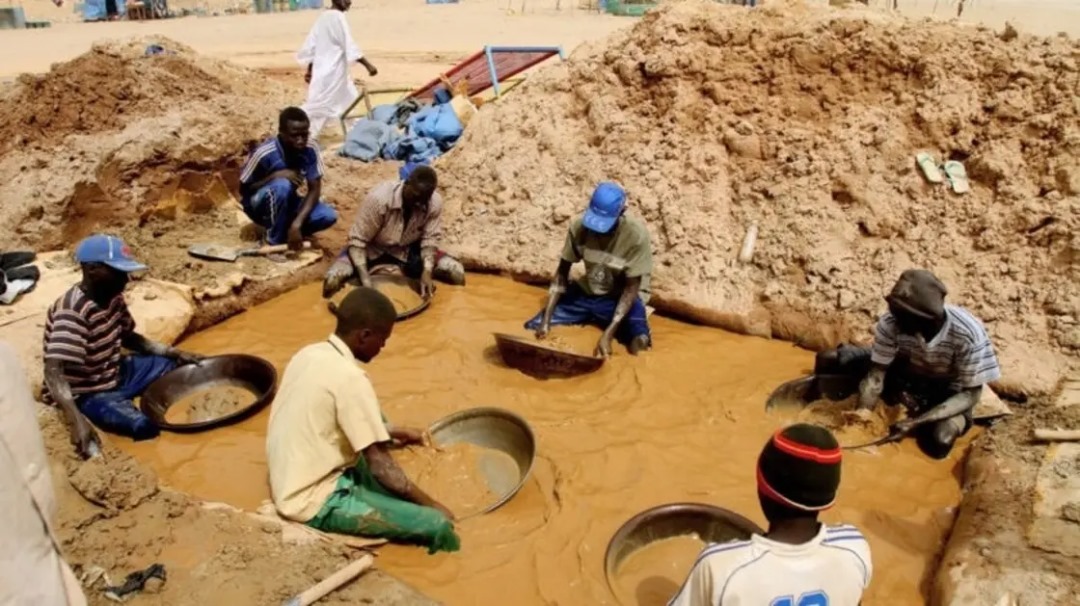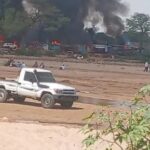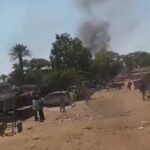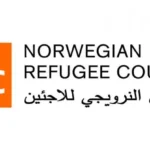Darfur Follow-ups: Enaam Al-Nour
Gold mines in Sudan have become a curse after they were a blessing for the state as a result of conflicts and rivalries over power. Sudan is considered one of the most important producers of the precious metal in the African continent and the thirteenth among the gold-producing countries in the world. The nature of the conflict currently taking place in Sudan has changed to a quest to control the yellow metal, threatening the outbreak of civil wars in the country.
This comes in light of the ambitions of capitalist countries to tamper with Sudan and seize its natural wealth of gold and other things. This metal is considered an essential component of the country’s exports, but its mines are surrounded by fierce and ongoing conflicts related to smuggling, and it is not yet clear what impact it will have on production and export operations.
Observers of Sudanese affairs considered that the gold that this country abounds with was among the causes of the war that broke out between the army and the Rapid Support Forces. They also explained that foreign companies, including Chinese and Russian, import this precious metal, from which Sudan produces more than 100 tons annually, of which only 30 tons go. To the state treasury. An American diplomat warned that “whoever has the gold must continue the war,” ruling out the end of the battles if the sources of funding for the warring parties were not dried up.
Regarding the role of gold in the crisis that occurred between the two former military allies, Al-Burhan and Hemedti, and the importance of gold in what is happening today, the ongoing war in Sudan revealed the issue of the importance of gold and prospecting, and gold was originally one of the main reasons for the outbreak of war between the army and the Rapid Support Forces and the dispute that occurred. Between them.
“He who has the gold must continue the war.”
For his part, the researcher in international relations and political economy Abu Bakr Al-Deeb explained that the wealth of the Sudanese people is being exploited in the current conflict between the army and the Rapid Support Forces. Al-Deeb said: “Sudan is one of the most important gold producers on the African continent and the thirteenth among the gold-producing countries in the world. Both sides of the conflict are trying to control the yellow metal, which has made Sudan one of the poorest countries, even though it is floating on a sea of wealth and gold reserves reach 1,550 tons. The gold industry in Sudan also provides enormous resources and wealth that is smuggled abroad to be spent on the civil war.”
“Sudan’s wealth is being exploited in the war between Burhan and Hemedti.”
The Hemedti family runs a large portion of the gold mines in Sudan, the third-largest producer of the yellow metal in Africa, so Hemedti “can pay the salaries (of militia members) that many in sub-Saharan Africa can match,” said researcher Andrea Craig of King’s College. In London, according to Agence France-Presse.
Gold revenues allow financing militias, the use of which has been a lucrative business in Sudan for decades. Khartoum has resorted to militias before, either to entrust them with the suppression of ethnic minorities and armed rebellious movements, or to send them to participate in wars abroad, adds the French news agency. Today, the Rapid Support Forces do not hesitate to publish video clips on the platforms of fighters in Chad or Niger declaring their support for them.
In turn, Al-Burhan said that “mercenaries came from Chad, the Central African Republic and Niger” were fighting with the Rapid Support Forces, and the army finally confirmed that it had killed a “foreign sniper.”
The same thing was stated by the United Nations envoy to Sudan, Volker Berthes, who stated that “the number of mercenaries who came from Mali, Chad and Niger with the support of the Rapid Support Forces is not insignificant.”
Mountain treasure, a year of random excavation and smuggling
Hundreds of Africans came from all over Sudan, Chad, Libya, Central Africa, South Sudan, Eritrea, Nigeria and Niger – and others from outside the continent – to Jebel Amer in search of its gold. This precious metal, whose reserves are estimated at billions of dollars, is smuggled abroad in various ways, leaving behind hundreds of dead among gang wars, cheap hard labor, and thousands of homeless people.
According to the reports of the United Nations Secretary-General to the Security Council in 2012, the death toll from gold mines was more than double the number killed in the conflict between the army, rebels and warring tribes in Darfur.
Jabal Amer is located in the Al-Sarif Beni Hussein region, southwest of Darfur, about 971 kilometers west of Khartoum. It has a mining area of about 20 square kilometers and more than 10,000 exploration areas. It is a major station in the conflict over Sudan’s resources.
This region is inhabited by two Arab tribes, the Rizeigat and Beni Hussein. These two tribes entered into a bloody war when gold was discovered in Jebel Amer in 2012, and with the advance of many non-Sudanese towards the region, the two tribes joined together through the mediation of the army to try to repel the strangers and their attacks on the residents of the region.
In fact, the predominant mining activity in that area was small-scale (individuals or small groups of artisans). According to many statistics, if we add small-scale and artisanal mining production to official production, in 2016 Sudan was the largest producer of gold on the continent after South Africa and Ghana, and the second largest exporter to the United Arab Emirates at prices much lower than the average annual price of gold, and also lower. Much higher than the minimum price of gold.
As the conflict worsened, the Rapid Support Forces, led by Hemedti, took control of the entire region and began intensively extracting gold, which made prospecting linked to armed gangs the dominant form of prospecting in the region.
Rapid Support has an investment arm, Al-Junaid Company. Through gold and officially approved mercenary activity, Al-Junaid Company has become a large conglomerate whose fields range from mining, iron and steel to investment and transportation.
Many reports indicate that Al-Junaid Company was selling gold to the Emirati company Rosella, and that financial transactions were taking place through the First Abu Dhabi Bank.
The UN Security Council report [1] on Sudan shows that about 48 tons of Darfur gold were smuggled to the UAE during the period between 2010-2014.
Last March, the Sudanese Ministry of Energy and Mining announced the resumption of gold production operations from Jebel Amer. This came after Al-Junaid Company withdrew from the gold exploration block there. In fact, the RSF had just begun arrangements to hand over the gold mining areas in Jebel Amer, but nothing had been officially announced.
“A hidden war over buried treasure”
Abu Bakr Al-Deeb, a researcher in international relations and political economy, believes that “Russia and the major Western powers have great political, economic, and security interests in Sudan. Russia fears, for example, that the current conflict will affect the ratification of the agreement between Moscow and Khartoum, regarding the establishment of a logistical center for the Russian Navy in Sudan, which is planned to become an important base or logistical center for the Russian Navy, because it provides direct access to the landlocked Central African Republic and the Sahara region. And the coast is where Russian mining companies operate. Sudan also represents the buried treasure of major countries, as it means 200 million acres of fertile agricultural land, 11 running rivers, 102 million heads of livestock, 400 billion cubic meters of annual rain, 1.4 million tons of uranium, 6.8 billion barrels of oil, and 85 billion cubic meters of gas. .
Al-Deeb adds that Sudan occupies second place in gold production on the African continent, with its annual production reaching more than 90 million tons, with a value of up to five billion dollars. It has also been known as the food basket of the world. It also has many resources, including silver, copper, and other things, in parallel with its geopolitical location, as it is considered the gateway to the Horn of Africa. Therefore, there is a hidden war between Russia and China on the one hand, and the West, that is, America and its European allies, over control and presence in many African countries, including Sudan, Libya, Central Africa, Mozambique, and Mali. It is a conflict of interests, influence, and greed for the wealth of all these countries, in addition to Turkey, which seeks to find a place for itself in Sudan from which to move towards the rest of Africa.”
According to Al-Deeb, “Moscow seeks to complete its military bases in the Red Sea, strengthen its influence on the African continent, and share Sudan’s wealth, such as uranium, gold, energy resources, and enormous agricultural potential, through its military presence there.” Before the outbreak of battles in Sudan, Mohamed Hamdan Dagalo (Hemedti) visited Moscow at the head of a high-ranking delegation in a visit that lasted 8 days, making it the longest visit by a senior Sudanese official to Russia, which aspires to greater influence in Sudan, and which maintained being the main source of weapons for the Sudanese army during Al-Bashir’s rule. There is a Russian military presence in Central Africa neighboring Sudan, and Russia is looking to build a base on the Sudanese coast overlooking the Red Sea to increase its influence in the Horn of Africa and expand its presence in the Bab al-Mandab Strait. Of course, the United States of America fears the increasing Russian or Chinese influence in Sudan, and it sees the possibility of their control over it as not only a warning of a potential threat to its interests in the region, but rather an indicator that prompts it to re-evaluate its interest in Sudan. “For this reason, senior American military officials visited Sudan during the recent period.”
International companies acquire Sudanese gold.”
Abu Bakr Al-Deeb also said, “Sudan’s gold is characterized by very high concentration rates, as each ton of extracted ore contains 100 grams of gold. There are international parties working to steal Sudan’s wealth in the absence of international law.” He explained that the 423 companies operating in the field of gold exploration in Sudan “occupy about 300 square kilometers of concession areas, in addition to what is produced unofficially.”
Al-Deeb also pointed out that “in March 2022, the Central Bank of Sudan issued a circular to the country’s banks banning the export of gold from government agencies and foreign individuals and companies, and restricting export operations to companies that have a concession to work in the field of mining only, and even limiting the role of the Central Bank in the gold market.” On purchases to build reserves only.”
For his part, Al-Raddad said, “Sudan produces more than 100 tons of gold annually, of which only 30 tons go to the state treasury, while the rest is shared between the two powerful men in the country, through five or more than five companies working in the field of gold exploration, following these steps.” Companies for China, Russia, Italy, and other countries. But what is striking is that Russia works through two parallel lines: Russian companies affiliated with the government and others affiliated with the Wagner Company, and it seems that the latter is one of the reasons for the dispute as well. This hypothesis is supported by the fact that the majority of this gold is transported after its extraction to Russia, and also to the United Arab Emirates, which is linked to… “With close relations with Sudan, whether with the army or the Rapid Support Forces.”
The ghost of Wagner…and a “private company for Hemedti’s empire”
Wagner also supports the Rapid Support Forces, and Sudan has even served as another rear base for them in the region as well as a source of funding for the Russian paramilitary group. The Hemedti family’s gold mines have signed contracts with companies that act as fronts for Wagner Chairman Yevgeny Prigozhin, according to the US Treasury Department.
In this regard, Alex Duval, an expert on Sudanese affairs, said, “Money and fighting are interchangeable in the Sudanese political market.” He added, “Hemedti trades in both.” He believes that “the Rapid Support Forces have now become a private, cross-border mercenary company, a company for extracting and selling gold, and the armed arm of Hemedti’s commercial empire.” If Hemedti wins the war, “the Sudanese state will become a branch of this transnational company,” according to the same source.
Hemedti has a strong economic card, as his forces, according to the Council of Europe Research Center on Foreign Relations, manage many gold mines in the country.
The United States confirms that the “Wagner” forces, which are Russia’s armed arm, are in many African countries, and are operating in Sudan, where they have been present since 2017, with the Rapid Support Forces in those mines to seize their resources. “Wagner’s forces were operating in Sudan out of the spotlight because the country’s need for security assistance was less than in Mali or the Central African Republic,” according to French historian and researcher at the Institute of Political Sciences in Paris, Roland Marchal.
“We are heading towards a war of corridors and straits”
For his part, Mohammed Al-Alfi, an expert in political economy, raised a remarkable issue related to what he called the “war of the corridors and straits” between the major international powers. He said in this regard: “Russia wants to have a naval military base that guarantees its presence in the warm waters, that is, the two sea regions.” The Mediterranean and the Red Sea, full of riches, treasures and raw materials. It also seeks to prevent America from controlling the entrances to the seas and oceans. We are heading towards a war of corridors, straits, and a war of water. Russia wants to be present in the region that includes the Bab al-Mandab Strait, the crossing to the Red Sea and then the Mediterranean. It wants to have a base in Port Sudan so as not to allow the United States to control this maritime region and the straits, where most of the major powers are already present. This is part of the current power struggle in the world and is declared even in the strategy that Putin spoke about recently. China also agrees with the Russian moves, and the common goal is to form the new world from several poles.”
Al-Alfi adds: “Russia is insisting and putting great pressure now because the United States is planning further deployment in the Red Sea, where it has already sent some ground special forces and naval vessels under the pretext of evacuation, but it plans to keep them. We have seen communication between Blinken and Hemedti, after which he called for international intervention.” The United States supports Hemedti, and there are dangers of the secession of the rich Darfur region, which extends over an area of one million square kilometers, rich in crude oil, uranium, gas, and large mines for extracting gold, which will also allow Hemedti’s influence to expand to the gold mines in Chad and Central Africa.” The political economy expert also warned that “the Sudan file is very close to what is happening in Ukraine.” We are heading toward an international influence struggle that heralds the outbreak of larger conflicts that may subside for a while but will flare up again. The region is preparing for something big, and we will see a large gathering of armed militias, which will pose great dangers to Sudan and other countries, especially Libya, Chad, Egypt, Saudi Arabia, and even Djibouti and Eritrea.”
Gold map
An expert in the mining sector and an opponent of Sudanese gold smuggling, Aladdin Faisal, says that shortly before the war, the Rapid Support Forces made their plans according to the map of gold production under their control. Therefore, any yellow metal mine in the Darfur region and West Kordofan will be under the control of the Dagalo forces while taking cover.
The army in the Sudanese capital.
Faisal explains that when the Rapid Support Forces focus on their military operations against the army, they take into consideration putting “gold mines” behind them to finance the fighting that may take years, or convincing allied countries to finance them with a gold guarantee.
Faisal believes that part of the reasons for Sudan’s war are due to the “curse of gold” and the race of the military parties to acquire the yellow metal, which has increased Sudan’s revenues since 2015. Mining activity has increased since the generals took control of the transitional authority, and it is part of the political agenda when the military communicates with the leaders of some countries, such as Russia, Egypt and the UAE are three countries that have influence over the two warring parties.








